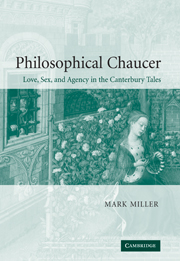Book contents
- Frontmatter
- Contents
- Acknowledgments
- Introduction: Chaucer and the problem of normativity
- Chapter 1 Naturalism and its discontents in the Miller's Tale
- Chapter 2 Normative longing in the Knight's Tale
- Chapter 3 Agency and dialectic in the Consolation of Philosophy
- Chapter 4 Sadomasochism and utopia in the Roman de la Rose
- Chapter 5 Suffering love in the Wife of Bath's Prologue and Tale
- Chapter 6 Love's promise: the Clerk's Tale and the scandal of the unconditional
- Notes
- Bibliography
- Index
Chapter 1 - Naturalism and its discontents in the Miller's Tale
Published online by Cambridge University Press: 22 September 2009
- Frontmatter
- Contents
- Acknowledgments
- Introduction: Chaucer and the problem of normativity
- Chapter 1 Naturalism and its discontents in the Miller's Tale
- Chapter 2 Normative longing in the Knight's Tale
- Chapter 3 Agency and dialectic in the Consolation of Philosophy
- Chapter 4 Sadomasochism and utopia in the Roman de la Rose
- Chapter 5 Suffering love in the Wife of Bath's Prologue and Tale
- Chapter 6 Love's promise: the Clerk's Tale and the scandal of the unconditional
- Notes
- Bibliography
- Index
Summary
One of the strangest moments in the Miller's Tale is the one in which Absolon, who has been waiting in the dark at Alisoun's window for a long-anticipated kiss, finds himself savoring the taste not of her mouth but of the “hole” she has so unceremoniously proffered. This moment will serve as a useful entry into the intersection between Chaucer's representations of erotic life and his philosophical poetics, and specifically into the way he combines an interest in the instability of hegemonic norms of gender and desire with interests in ethics, agency, and practical reason.
This Absolon gan wype his mouth ful drie.
Derk was the nyght as pich, or as the cole,
And at the wyndow out she putte hir hole,
And Absolon, hym fil no bet ne wers,
But with his mouth he kiste hir naked ers
Ful savourly, er he were war of this.
Abak he stirte, and thoughte it was amys,
For wel he wiste a womman hath no berd.
He felte a thyng al rough and long yherd,
And seyde, “Fy! allas! what have I do?”
(I.3730–39)I begin with this moment partly because of its distance from the explicitly philosophical themes that crop up from time to time in Chaucer's poetry: in the place of epistemological subtleties or worries over the freedom of the will, the Miller offers us some dirty sex and a good joke.
- Type
- Chapter
- Information
- Philosophical ChaucerLove, Sex, and Agency in the Canterbury Tales, pp. 36 - 81Publisher: Cambridge University PressPrint publication year: 2005



